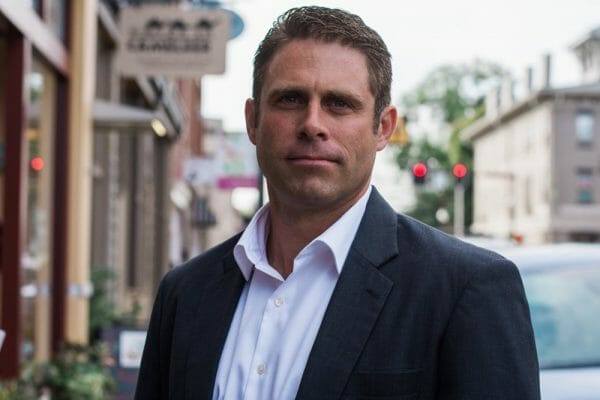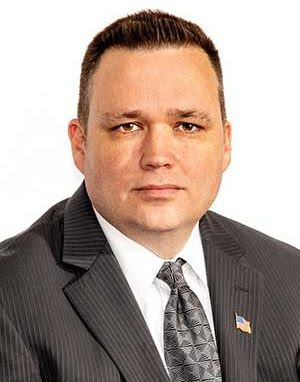U.S.A. –-(Ammoland.com)- On the floor of the Virginia House of Delegates, Nick Freitas gave an impassioned speech in defense of the Second Amendment. He said what most gun owners were thinking about the attacks on our rights after the school shooting in Parkland, Fl.
The video went viral, and most people learned of Nick Freitas for the first time. Nick has been fighting for our rights for years. He served as a Green Beret. He did two combat tours in Iraq before coming home to fight for our rights in other ways.
After a few years in the private sector, Nick entered the State Government, serving as a member of the Virginia House of Delegates representing the 30th district.
Nick is now running for the Republican nomination for a U.S. Senate seat currently held by Tim Kaine. He has racked up endorsements from Rand Paul, Ron Paul, and Mike Lee. I had a chance to speak with Nick on gun rights issues, immigration, and tax reform.
John: I will start from where I always start. Why do you want to run for Senate?
Nick: Well, I always tell people when they ask me that, it’s a little like asking me why I wanted to go to combat. There was a need, and I know that sounds a little bit cliché, but I don’t know how else to explain it.
I never dreamed of being a U.S. Senator one day. I wanted to be a soldier, and that’s what I did for most of my younger years. Eleven years active duty in the military. The reason why I think it’s necessary right now in Virginia is that we have representation in the form of Tim Kaine, who clearly among other things opposes the Second Amendment. He brags about his F grade from the NRA, and it’s not just about the Second Amendment.

It’s about what do you see as government’s proper role and relationship with the people. For me, government exists to protect our liberty, to protect our property, and provide equal justice before the law. Among that is ensuring that the government understands that we have a right to be able to defend ourselves as free people.
Tim Kaine clearly stands against a lot of that, and so he needs to go. That’s why I’m running.
John: You gave a truly impassioned gun-rights speech on the floor of the Virginia House of Delegates. I think it got 11 million hits on Facebook. What inspired you to give that speech?
Nick: Well, I actually sit on the subcommittee on militia, police and public safety in the General Assembly that handles all the gun legislation. So, for just weeks upon weeks, we have been hearing certain Democrat colleagues compare us to Nazis, comparing us to segregationist suggesting that if we didn’t vote for their particular anti-Second Amendment bills than we wanted guns to fall in the hands of terrorists. I mean it was just one personal attack after the next.
It was frustrating because these same people that were launching these personal attacks were then trying to lecture everybody on civil dialogue and reasonable legislation in order to protect our kids. I was fed up. I was absolutely fed up.
There are so many things that we actually agree on that will actually protect our kids, like additional school resource officers, or trauma-informed education for first responders and teachers, or various ways that we can address the behavior, but unfortunately a small group, and I do believe that there’s a much smaller group than the media sometimes suggest, they look at this tragedy as a way to exploit it in order to gut the Second Amendment.
So, they’re not interested in talking about all of the other things that we could be doing that we all agree on that are not controversial in order to protect our kids. Instead, they want to use this situation to really curtail our Second Amendment rights, and I was tired of it. So, I felt it was about time that we not only defend ourselves, but that we also point out some of the rampant hypocrisy and the accusations that were being thrown against us and try to refocus the debate on what we could agree on, and what we should be doing Instead of exploiting the tragedy.
John: Were you surprised by the reaction that the speech got online from around the country?
Nick: I was surprised by a couple of things. One, I was surprised by the reaction of the Democrats. They all requested a recess, and several of them started to walk out during the speech, and then the next week they gave speeches about how offended they were. For me, it was amazing that here they could watch as their colleagues compare us to Nazis and segregationist and we were just supposed to take it.
The moment someone brought up that this was not civil dialogue, the moment someone brought up that maybe we should look at other data points besides the ones that they were concerned with, and when someone brought up the honest history of the Democratic Party, all of a sudden, they were grossly offended and just couldn’t believe someone would do that.
Well, again, if you’re offended by the truth, maybe your problem is with the truth, not me, but as soon as it went online, it immediately took off. We first put it online because the media and others had just desperately tried to misrepresent what I had said.
There was one headline and the Richmond Times dispatch that said, “Delegate suggests abortion leads to mass shootings.”
Well, anybody that saw the speech could see what I was actually saying, but that’s sort of misrepresentation was rampant early on. We wanted to counter that with what the actual speech was about. 40 million hits later we’ve just gotten an overwhelmingly positive response.
John: What is your opinion on the National Firearms Act?
Nick: My problem with all of this is that we keep focusing on the Second Amendment as if it’s just about firearms, and really what it is ultimately about is your right to self-defense. Firearms are a key component of that.
If you really look at it, firearms were the first thing that came about that allowed a weaker person to be able to defend themselves from a stronger opponent or a stronger attacker. Any sort of effort that we have which gives this false sense to society that by curtailing the rights of law-abiding citizens, we can somehow protect people, I think it’s just a false narrative to start off with.
Regardless of what the act is, regardless of what any of it is, I want to make sure that we’re protecting people’s right to defend themselves. Firearms are a critical aspect of that. I don’t think there’s any doubt that the Second Amendment conveys an individual right to keep and bear arms.
So the quick answer for not only for this, but anything else the question is, “Is this infringing on someone’s Second Amendment rights?”
If it is, then I’m going to oppose it. If it’s supporting law-abiding citizen’s right to be able to defend themselves, then I’m going to support it.
John: What motivated you to become a Green Beret?
Nick: I always wanted to join the military from a pretty young age. In my family, my mother is a nurse. My father is a police officer, my grandparents were in the military, my great grandparents… So, there’s a line of service with law enforcement, medical field, the military, and part of me wanted to carry on that legacy.
Then another part of me just felt that I have a lot of dedication to my country and not just the country but the Constitution, the Declaration of Independence, and the philosophy which has made it possible. I want to do assume personal responsibility for its security. The military was a way I felt I could do that and I could contribute to that.
Honestly, I loved it. I absolutely love being a Green Beret. I didn’t join Special Forces until after 9/11. I was infantry before that, but I saw what Special Forces was able to accomplish and the sort of mission set that they were engaging in. That was something I wanted to be a part of.
John: Sanctuary Cities have been in the news a lot lately. Would you support withholding federal funds from those cities?
Nick: Yes.
I think it’s about time that we understand that there’s a lot of things that the federal government is engaged in right now that I don’t think are legitimate functions within the federal government, but border security and immigration policy is something that I think is legit. You have some of these communities now when you look at the welfare that we have in this country, and clearly, we need a lot of reform within that, but I think everyone agrees that those welfare programs and those support programs, at least the intention of them, is to provide a safety net for US Citizens.
When a sanctuary city allows people to essentially benefit from those programs, they’re overtaxing an already overtaxed system, and this isn’t because we have a lack of compassion for people want to come to this country. I think immigrants make up some of the most loyal citizens you’ll ever find because they fled countries and they understand the importance of having rule of law and a government that respects liberty.
The problem is that when a town or a municipality is undermining that rule of law there, they’re not just creating a fiscally impossible situation. They’re also creating a situation which is incredibly unfair, not only US Citizens, but everyone that is trying to come to this country legally.
We’re telling all those people that are patiently waiting in line that we’re going to give priority to someone that jumped ahead of them, and I don’t think there’s anything fair and compassionate about that.
John: I am a strong believer in education reform. If you look at the systems that work from around the world plus all the studies, our system is broken. How much does that have to do with the Teacher’s Union blocking any meaningful changes through stuff like eliminating tenure?
Nick: I think it’s interesting. I forget which President of the Teacher’s Union it was, I think it was in the eighties, but they asked him, “Do you care about the students?” and he goes, “Well, when the students join the union I will care about their interests” I’m paraphrasing, but that was a fairly accurate representation of what he was saying, and I think the problem is a couple of things.
It’s not just the teachers. It’s government monopolization of education. Again, they call it “universal education,” just like they call it “universal healthcare.” It’s not. It’s government. It’s a government monopoly over education.
Let’s imagine the government wanted to help hungry people, and so the government opened up 10,000 government grocery stores and you were assigned a grocery store based off of your address, and when you showed up to the grocery store, you didn’t actually select your groceries. They were already determined for you based off of a government caloric index for your family, and the people that worked at the government grocery store were all government employees. None of them were ever rewarded based off of innovation or work ethic or ingenuity or creativity. They were just rewarded based off of seniority.
Now imagine that system and ask yourself, “would that be a good way to feed hungry people?”
I think almost everybody would say, “Absolutely not. That would be horrible. It wouldn’t be good for the employees, and it wouldn’t be good for the people.”
I would agree with that, but that’s exactly what we did with education. We set up thousands of government schools. We send you to one based off of your address. You have no say in the product that you get. The curriculum is determined for you largely by the government. Teachers are not rewarded based off of creativity or ingenuity. They’re rewarded based off of seniority, so why are we surprised that what we all recognize wouldn’t work for another critical component of society, which is feeding people, why would we assume that will work for education?
I think we need to move toward is a system where dollars follow the students because what you see in that sort of dynamic is a marketplace for education. All of a sudden judging teacher performance is no longer based off of arbitrary standard test scores. Judging student performance is no longer based off of arbitrary government edicts and mandates. All of a sudden students and parents are treated like customers in a situation where different institutions and organizations and teachers are competing for their business.
By the same token, teachers would then be rewarded for their creativity and their ingenuity. It’s not parents that are concerned about standardized testing. It’s politicians, so I think if we had more of a marketplace approach to education, you would get an educational system that would be as diverse as the student population it is seeking to serve. The end result is you would have a situation where parents are more involved. Teachers are more involved in, quite frankly, politicians and bureaucrats would be less involved, which is what we need at this point.
John: The debt is out of control. It seems like it is rising exponentially. What can be done to combat the rising debt?
Nick: Well, the only way that you can really legitimately combat debt is through spending reform. There’s a lot of people say you can raise taxes. The problem with that is that every time you raise taxes, you’re taking money out of the hands of the people that earned it, that created that wealth, that created that prosperity. The people that would reinvest that wealth into additional prosperity, additional innovations, services, products, and jobs. Then you’re putting it over to the government sector, and the result is always going to be greater waste and greater inefficiency.
We need to get spending under control. It doesn’t mean that all of the different services that are currently being provided by some government agency would suddenly go away. What it would mean is that instead of that money going through Washington, being run through bureaucracy, and then only a portion of it being sent back that the money will stay in the communities where it originated from in the first place. The end result would be that you’d get a lot more bang for your buck with respect to the spending that would go on through greater economic opportunity within the voluntary sector, which is the private economy. As opposed to going to the coercive sector which is the government.
So, you have to get spending under control. We’re going to have to attack with entitlement reform. The largest portion of the overall budget really has to do with Medicaid, Medicare, and social security. The thing that we have to realize is the government is not really good at running health insurance. I think they’ve demonstrated that for several decades now.
The government is also not good at managing people’s retirement. Especially with social security, the most important thing we have to do is keep our commitment to the people that are dependent upon this program. The people that have paid into it, but we also have to provide future generations with more control, more options over security for their own retirement.
I think there’s a lot of creative ways that we can do that, that does allow us to honor our commitment. It doesn’t put anybody in a bad situation, but it provides options going forward, and that’s what we’re going to need if we really want to get our spending or budget under control.
John: Would you support overhauling the tax code?
Nick: Oh, absolutely. The issue that we have right now is that all of the reforms that we’ve attempted and that we are attempting, and I think the Trump administration did a good job with this last tax reform, is that they all have to operate within the boundaries of the 16th Amendment of the Constitution, which is essentially the federal income tax.
So, if we want to see some real reforms within those boundaries, then I think we’re going to have to move to a flat tax. But if we could actually amend the 16th amendment, we could move to something like a fair tax, which I think would require a whole lot less resources to implement.
You really wouldn’t need this huge IRS apparatus, and you could actually collect taxes in a way that I think would be a lot fairer and equitable.

Find out more about Nick Freitas and his campaign.
About John Crump
John is a NRA instructor and a constitutional activist. He is the former CEO of Veritas Firearms, LLC and is the co-host of The Patriot News Podcast which can be found at www.blogtalkradio.com/patriotnews. John has written extensively on the patriot movement including 3%’ers, Oath Keepers, and Militias. In addition to the Patriot movement, John has written about firearms, interviewed people of all walks of life, and on the Constitution. John lives in Northern Virginia with his wife and sons and is currently working on a book on the history of the patriot movement and can be followed on Twitter at @crumpyss or at www.crumpy.com.
